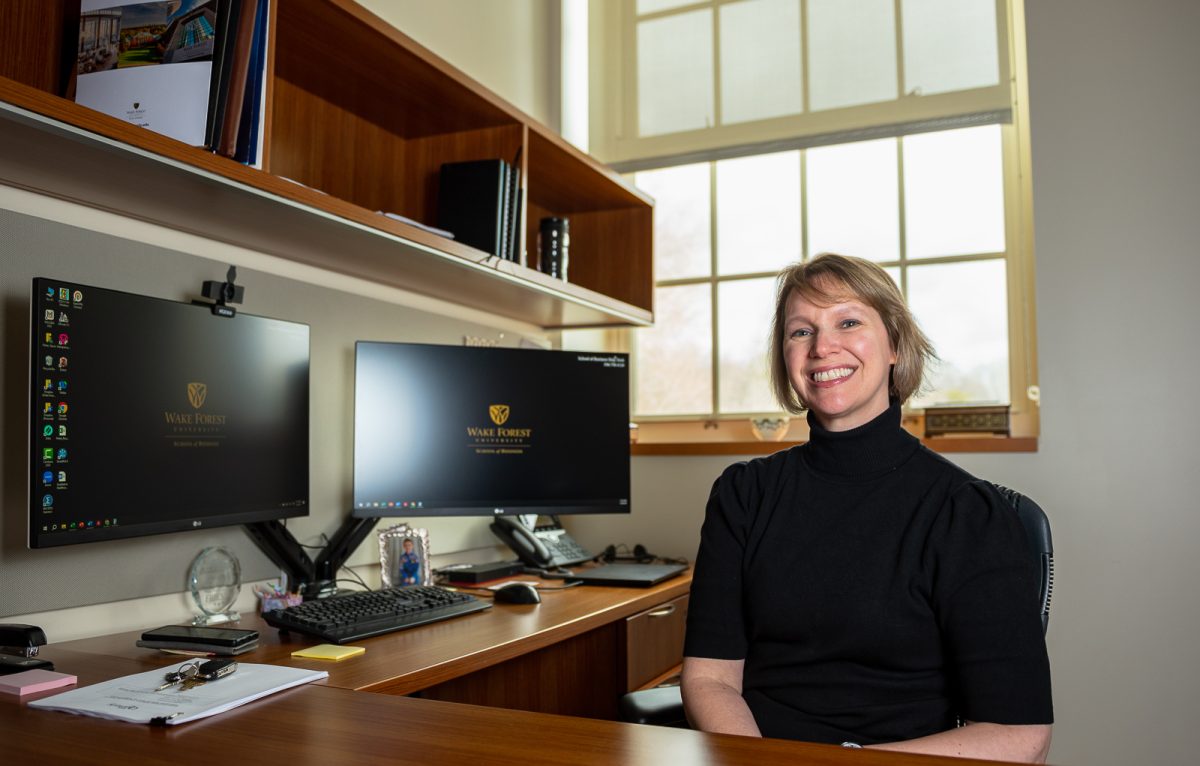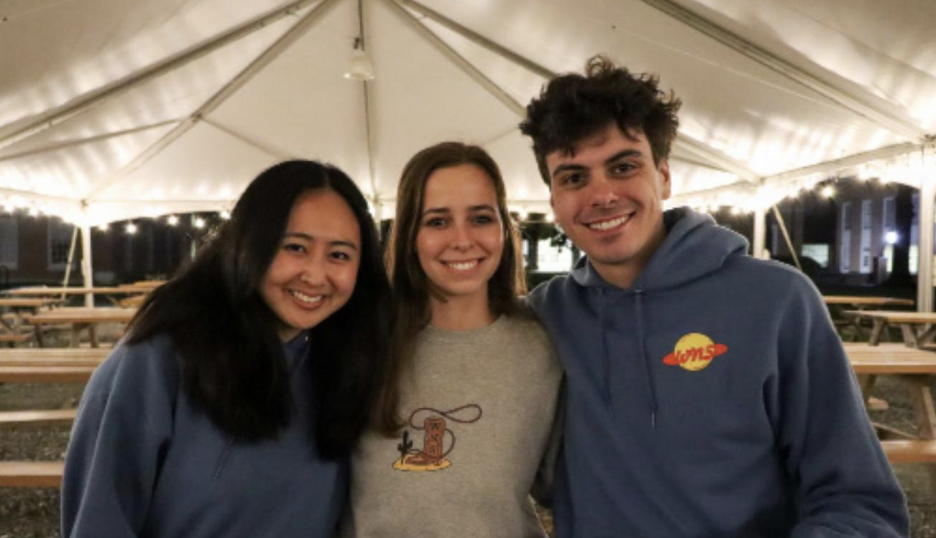California, Ohio and North Carolina may be far apart, but faculty members from the states’ higher education institutions are teaming up for an engaging research initiative that brings together scholars from diverse disciplines.
Stacie Petter, the area chair and professor of management information systems at the Wake Forest School of Business, and her research team secured close to $1 million in funding from the National Science Foundation (NSF) in September 2023. Their project focuses on exploring unethical decision-making in supply networks and bridging gaps between academic fields.
“Dr. Petter is an outstanding researcher and teacher who works on societal problems and technology solutions,” Jeffrey Camm, senior associate dean of business analytics at the Wake Forest School of Business, said. “Her area of research is well aligned with our program supporting collaboration.”
How the project came about
Since joining Wake Forest in 2022, Petter, who has a PhD in computer information systems from Georgia State University, has centered her research on the beneficial and harmful impacts of technology. Petter spearheaded a project targeting illicit activities within supply networks, addressing sex trafficking in the massage industry by teaming up with Gisela Bichler of California State University, San Bernardino and Felipe Aros-Vera of Ohio University.
“We study information technology to understand how people, groups, organizations and society use and manage technology, and what are the impacts, positive or negative, associated with it,” Petter said. “One of the things that we’re trying to better understand is why people make illicit or bad decisions — decisions that lead them down a criminal or an unethical path.”
Traffickers around the world are quick to exploit every new technology that comes their way. They use violence, fake job offers and fraudulent education opportunities to deceive and exploit their victims. At every step of their illegal activities, traffickers rely on web technology. Today, around 50 million people worldwide fall victim to modern slavery.
The idea of integrating information systems to combat human trafficking emerged from Petter’s collaboration with Laurie Giddens, an assistant professor at Southern Illinois University Edwardsville. These two women were united in their mission to harness their information systems expertise to address this global challenge.
Building a larger team
In 2020, Petter and Giddens secured a $250,000 grant from the NSF, assembling an interdisciplinary team of academics, law enforcement experts, district attorneys and non-profit professionals. Collaborating across engineering, business and social science fields, they leveraged their diverse backgrounds in supply networks, network analysis, human trafficking and information technology to devise strategies for combating illegal supply chains.
Our research may be able to inform organizations on how to review financial records, which are electronic, and use technology to try to see if other transactions are happening at unusual times of day. We hope to provide insight on indicators that suggest that maybe something illegal is happening here and find ways to intervene.
— Stacie Petter, Area Chair and Professor of Management Information Systems at the Wake Forest School of Business
As Petter embarked on this project with Giddens, she came to recognize the limitations of her understanding. While she possessed a firm grasp of the intricacies of technology within a business setting, she lacked knowledge in areas like crime.
“We have a limited perspective of the world, so we wanted to put together this larger team with the first NSF grant,” Petter said. “We tried to find people who have the knowledge that we don’t have.”
For example, while collaborating with Bichler, a criminology professor, Petter learned how massage parlors may resort to illegal services for a competitive edge. Aros-Vera, an industrial engineering faculty member specializing in logistics, provided expertise on supply networks including customers, suppliers and logistical operations.
Petter, on the other hand, brought her knowledge of the commercial and business dimensions of human trafficking to the table.
“Our research may be able to inform organizations on how to review financial records, which are electronic, and use technology to try to see if other transactions are happening at unusual times of day,” Petter said. “We hope to provide insight on indicators that suggest that maybe something illegal is happening here and find ways to intervene.”
Petter also knows how competition can drive businesses to prioritize profits or seek advantages, even in morally gray areas.
“It was really about trying to get the right mix of people and thinking through the problem that we all offer something unique to,” she said. “From my perspective, I understand the business side of it.”
The project so far
With the current funding of $1 million, Petter and her team shifted focus to spotting online signs of illicit activity, using models and simulations to understand decision-making in the underground massage industry — specifically among providers, buyers and suppliers. They plan to adapt these models to study similar dynamics in sectors with potential illicit supply networks, like agriculture and pharmaceuticals.
Using “agent-based modeling,” which operates like a virtual game with predefined rules for interacting agents, researchers simulate the spread of illicit activities in the supply chain and identify potential system vulnerabilities.
“We’re going to use theory and insights from literature and [interviewees] who have knowledge about those who engage in illegal activity,” Petter said. “We know from criminal justice research the percentage or the nature and why people make these decisions, so we’re going to start with using existing theory and understanding and then try to figure out how people get to these bad decisions.”
Ultimately, our project embodies the concept of radical collaboration, demonstrating how different universities and disciplines can work together creatively to tackle complex societal issues.
— Stacie Petter, Area Chair and Professor of Management Information Systems at the Wake Forest School of Business
Petter eagerly anticipates the project’s next phase, scheduled for the 2026 calendar year, in which students from Wake Forest University, Ohio University and California State University, San Bernardino will join to extend and apply models in diverse sectors.
“We want to further integrate similar research funding from the project, like [what] Dr. Petter did, into our current plan or experiential learning opportunity, so that faculty can bring their research back into the classroom,” Camm said.
With options in agriculture, pharmaceuticals or consumer products, students will explore industry nuances and model implementation.
“We’re going to do a joint class across all three universities for two different semesters,” Petter said. “One semester is likely going to be about understanding the nature of the industry and how the model would apply. Then in the second semester, a group of students will try to apply the model and see what we can learn and if there are things that are similar or different across industries.”
The project’s success metric is to identify interventions and employ laws, policies, regulations and business practices to curb illicit decisions. Petter’s team — collaborating with an advisory board of law enforcement, industry experts and academics — will ensure that the suggested interventions, promoting legal and compliant behavior, are not merely theoretical but culminate in a clear and implementable outcome.
“Ultimately, our project embodies the concept of radical collaboration, demonstrating how different universities and disciplines can work together creatively to tackle complex societal issues,” Petter said.








